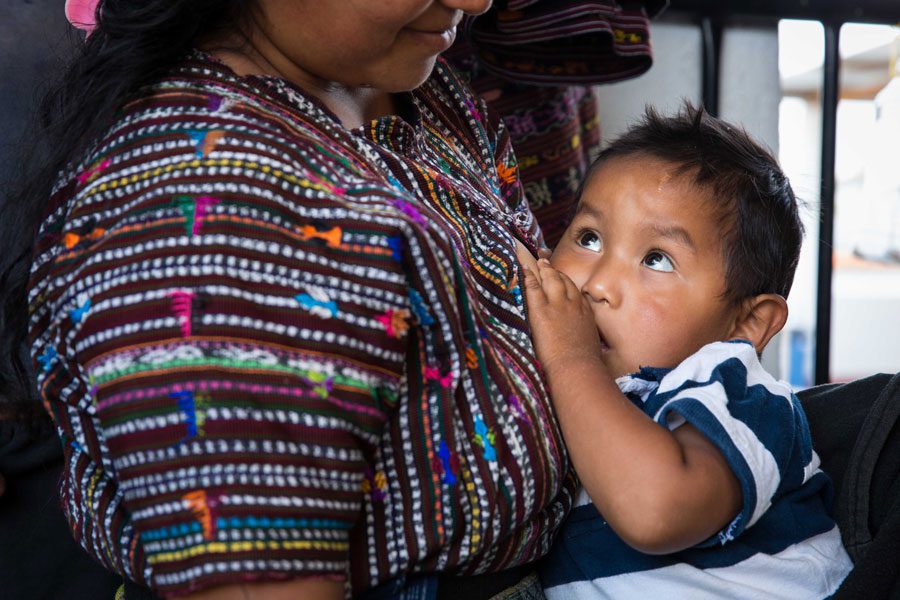Improving Infant and Young Child Nutrition
Vitamin Angels is scaling up additional evidence-based programming to support optimal nutrition during the first 1,000 days — from pregnancy through age two.

Protecting a child’s health, well-being, and future starts at the very beginning.
Good nutrition during this critical window is vital to increasing a child’s chances of survival, improving growth and development, and ensuring positive health outcomes. Vitamin Angels aims to support policies, behavior change strategies, health care provider training, and counseling, to enable mothers and caregivers to make informed decisions about feeding their children.
Following birth, our infant and young child feeding programming supports exclusive breastfeeding for the first six months. From six months to two years of age, nutrient-rich complementary foods should be introduced along with continued breastfeeding. We also have supplemental feeding programs for young children to address food insecurity, increase dietary diversity, and promote healthy growth and development.
Saving Lives with Early and Exclusive Breastfeeding
Breastfeeding is one of the most effective ways to promote the health and survival of children. In many settings, it’s the difference between life and death for babies. The World Health Organization recommends infants begin breastfeeding within an hour of birth and exclusive breastfeeding for the first six months.
Breast milk is the ideal food for infants because it provides all the essential vitamins and minerals needed to support their growth and development and passes on antibodies that provide protection from common childhood illnesses. In addition, the benefits of breastfeeding are lifelong. Breastfed children have better cognitive outcomes and educational attainment and a lower risk of being overweight, obese, or experiencing chronic diseases later in life. And the benefits of breastfeeding extend to mothers, too, by lowering the risk of postpartum depression, reducing body mass index, and lessening the risk of ovarian and breast cancers.

Preventing Malnutrition Through Complementary Feeding
As infants grow, they need more energy and nutrients than breast milk alone can provide. At around six months of age, babies should begin eating nutrient-rich and age-appropriate complementary foods and continue to nurse until age two or beyond. This period is a crucial opportunity for preventing all forms of malnutrition and setting children on a path to a lifetime of good health.
Children are particularly vulnerable to faltering growth during this stage, including underweight and stunting (being too short for their age due to a chronic lack of essential nutrients). Stunting can have devastating, lifelong consequences. It hinders brain development which impedes the ability to learn as a child and earn a living as an adult.
Globally, few children receive nutritionally adequate complementary foods. And increasingly, caregivers and young children are exposed to unhealthy commercial complementary foods with concerning amounts of added sugar, salt, and saturated and trans fat, that can fill up small bellies with empty calories and displace healthier options. The consumption of unhealthy, processed food is rising globally, and worldwide more than 38 million children under five are overweight, increasing their risk of future diet-related diseases like diabetes and heart disease.
Increasing Dietary Diversity with Supplemental Feeding
Optimal nutrition promotes opportunity for all. When pregnant mothers and young children have access to the nutrition they need, it creates a ripple effect that impacts families and communities and helps to create a more equitable world. Vitamin Angels offers supplemental feeding programs for young children to address food insecurity, increase dietary diversity, and promote healthy growth and development.
Vitamin Angels is Working to Improve Infant and Young Child Nutrition
Vitamin Angels recognizes that the right, enabling environment — including the surrounding health system, communities, and policy environment — helps mothers and caregivers make informed decisions about feeding their children. We support policies, behavior change strategies, health care provider training, and nutrition counseling for mothers to create a supportive environment for improving the nutrition practices and health of entire communities.
Virtually all immediate and underlying causes of malnutrition are behavioral. To ensure women and children benefit from evidence-based nutrition interventions like breastfeeding, we must identify the range of factors at play on multiple levels – individual, interpersonal, community, societal – that influence a particular behavior. That’s why our programming incorporates Social and Behavioral Change (SBC) approaches – interventions aimed at addressing those factors with the goal of changing a behavior. SBC follows a systematic process to design and implement the most effective, context-specific, programming to address the unique needs of each community we work with and conducting research in the local environment to inform our approach.
See More Interventions

Vitamin A and Deworming

Prenatal Vitamins and Minerals

